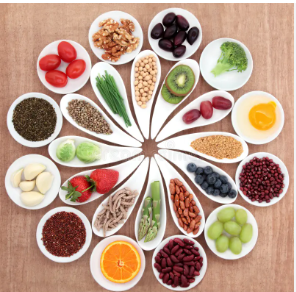

Health Benefits
- Improved Heart Health:
- Plant-based diets are typically rich in fruits, vegetables, whole grains, nuts, and seeds, all of which are known to improve cardiovascular health. These foods are high in fiber, antioxidants, and healthy fats, which help reduce cholesterol levels and lower blood pressure.
- Weight Management:
- Diets centered on plant foods tend to be lower in calories and higher in nutrients compared to diets rich in animal products. This can aid in weight loss and help maintain a healthy weight, reducing the risk of obesity-related diseases.
- Lower Risk of Chronic Diseases:
- Consuming a plant-based diet has been associated with a reduced risk of developing chronic diseases such as type 2 diabetes, certain cancers, and hypertension. The antioxidants and phytonutrients found in plants play a crucial role in disease prevention.
- Better Digestive Health:
- The high fiber content in plant foods promotes healthy digestion by aiding bowel movements and preventing constipation. It also supports a healthy gut microbiome, which is essential for overall health.
- Increased Energy Levels:
- Plant-based diets can provide sustained energy due to their high nutrient density and the presence of complex carbohydrates. These carbohydrates release energy more slowly compared to simple carbs, preventing energy crashes.
Environmental Benefits
- Reduced Greenhouse Gas Emissions:
- Animal agriculture is a significant contributor to greenhouse gas emissions. By shifting to a plant-based diet, individuals can significantly reduce their carbon footprint. Plant-based foods generally require fewer resources to produce and generate lower emissions.
- Conservation of Water Resources:
- The production of animal-based foods typically requires much more water than the production of plant-based foods. For instance, producing one pound of beef requires approximately 1,800 gallons of water, while growing one pound of vegetables requires substantially less.
- Reduced Deforestation and Habitat Loss:
- Large swathes of forest are cleared to create pasture land and grow feed crops for livestock. Adopting a plant-based diet can help reduce the demand for these practices, thereby protecting forests and preserving biodiversity.
- Sustainable Land Use:
- Plant-based diets require less land for food production compared to meat-based diets. This means more land can be left in its natural state, supporting ecosystems and wildlife.
- Decreased Pollution:
- Livestock farming generates significant amounts of waste, which can pollute waterways and soil. Plant-based farming tends to produce less waste and is less likely to cause environmental pollution.
Practical Tips for Transitioning to a Plant-Based Diet
- Start Slowly:
- Gradually incorporate more plant-based meals into your diet. You might begin with meatless Mondays or try swapping animal products for plant-based alternatives a few times a week.
- Experiment with New Recipes:
- Explore diverse cuisines and recipes that focus on plant-based ingredients. This can make the transition enjoyable and expose you to a variety of flavors and cooking techniques.
- Educate Yourself:
- Learn about the nutritional aspects of a plant-based diet to ensure you’re getting all the necessary nutrients. Consider consulting a nutritionist or dietitian if needed.
- Stock Up on Staples:
- Keep your pantry stocked with plant-based staples like beans, lentils, whole grains, nuts, seeds, and a variety of fruits and vegetables. Having these ingredients on hand makes it easier to prepare plant-based meals.
- Join a Community:
- Connect with others who are also following or transitioning to a plant-based diet. This can provide support, inspiration, and practical advice.
Conclusion
Embracing a plant-based diet offers numerous benefits for both personal health and the environment. By making conscious choices about what we eat, we can improve our well-being and contribute to a more sustainable and compassionate world.
